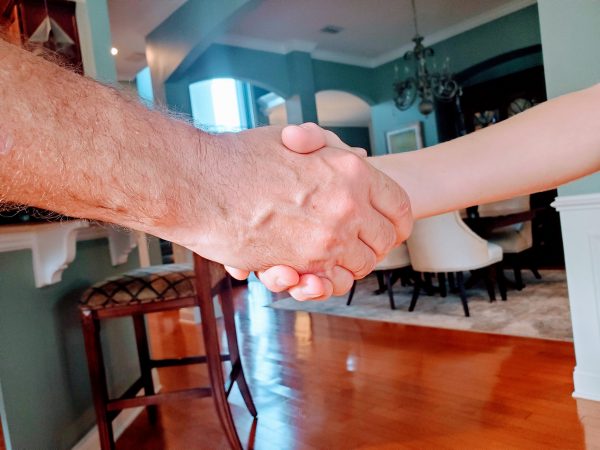 A few years ago, one of my son’s friends called me by my first name. He was 8 years old. He walked right over to me and straight-up said, “Meredith,” like he was a peer of mine. Like we were somehow colleagues. I was a bit taken aback, paused to adjust a potentially offensive tone of voice, and then kindly corrected him: “Please call me Mrs. Meredith or Mrs. Loudenback,” emphasizing my enunciation of “Mrs.” Up until this point, we encouraged our son to use good manners. You know the basics: please, thank you and you’re welcome, yes/no ma’am and sir, and Mr./Mrs./Ms. Last Name. But when I was addressed by an 8-year-old without a “Mrs.” in front of my name, we stopped encouraging good manners — we insisted on them.
A few years ago, one of my son’s friends called me by my first name. He was 8 years old. He walked right over to me and straight-up said, “Meredith,” like he was a peer of mine. Like we were somehow colleagues. I was a bit taken aback, paused to adjust a potentially offensive tone of voice, and then kindly corrected him: “Please call me Mrs. Meredith or Mrs. Loudenback,” emphasizing my enunciation of “Mrs.” Up until this point, we encouraged our son to use good manners. You know the basics: please, thank you and you’re welcome, yes/no ma’am and sir, and Mr./Mrs./Ms. Last Name. But when I was addressed by an 8-year-old without a “Mrs.” in front of my name, we stopped encouraging good manners — we insisted on them.
Is it just me, or is the expectation for children to have good manners not a priority anymore? I mean, I know I’m in an older age bracket than most moms who have the same age children that I do, but I’m not a dinosaur! Or am I expecting too much? !Broken Record Alert! I’m sad that modern times are so casual now. People aren’t dressing to impress when they travel or go to the theatre anymore. Heck, does “Wear your Sunday best” still even mean anything? Even the attitude toward good manners in children seems lackadaisical. I only occasionally hear, “May I please,” “yes ma’am,” or “no sir.” Disappointingly, I usually hear, “Can you get me,” “yeah” (not even yes), and “no.” And it’s common for me to hear kids call adults by their first names like they’re equals. With that being said, I do hear many littles saying “please” and “thank you,” but that seems to be the only practice of manners I hear from young ones these days. Instilling good manners is so much more than teaching them to say these basics and so much more about teaching them to respect their elders.
Good manners give our children self-confidence.
Parents, teachers, and other adults have complimented our son’s manners. We always share their praise with him, and I wonder if the compliments about his manners are more because, in today’s times, they are considered an anomaly. My favorite is when an adult pays compliments directly to my son about his manners. My neighbor did this last week, and he could not contain his huge smile (or flushed cheeks), and his chest puffed out with pride. He became aware early on that adults appreciated his use of good manners, which made him comfortable talking with adults sooner than many kids. He confidently looks adults in the eye while speaking with them, tries his best not to interrupt their conversation (so tough!), and is eager to close the conversation with pleasantries like, “Nice to meet you,” “Thanks for having me over,” and “Thanks for your help.” The confidence he has gained interacting with adults in this way has benefited him greatly in school with his teachers, especially when he answers questions during class, gives presentations, or needs to email them. His manners and confidence helped him develop a great handshake, too, a must for young adults, boys, and girls. These little tools yield big results for children and are essential in cultivating their social grace.
Good manners contribute to the development of their emotional IQ.
Good manners convey quite a bit of information. They teach our children about respect for the sensibilities of others. Manners make someone feel appreciated (thank you), show you respect their right to say no (please), acknowledge their authority (May I please be excused?), and have other significant positive implications. Manners matter. Research has shown learning good manners early yields long-term benefits, and there is a strong association between kids’ social skills in Kindergarten and their success and well-being as adults. I’m not just talking about landing a great job because of having good manners — although this could only benefit the interview process, I’m sure! When parents discuss with children about the importance of good manners, praise them for being considerate and showing sympathy (I’m sorry), regularly talk with them about how others may feel in a situation, the foundation is being set for compassion and empathy to blossom. These are essential life skills necessary for developing their social and emotional IQ.
People with high emotional intelligence have a great self-awareness and self-control which result in better communication skills and social interactions. These are characteristics that don’t come easily for our son, so insisting on good manners is our building block. Praising him for good manners, having frequent talks about how others feel, and helping him identify his emotions in situations, is how we try to develop his communication and social skills. He may be challenged with regulating his emotions in a moment, but once he’s had time to reflect on a situation, he is the best apologizer I’ve ever known. Having a strong sense of accountability and the ability to genuinely say, “I’m sorry,” is also important in evolving emotional intelligence. Emotional intelligence is the key to successful relationships and reaching one’s greatest potential.
Kindness seems to be the trait parents feel is most important for children to learn. While kindness is so important, is being kind enough? I’d love to see “Mrs. Last Name” and “ma’am” and “sir” also become the trend in teaching social skills to our children. Having good manners goes beyond being kind. It’s about making others feel appreciated, welcomed, loved, respected, and that they are worthy. It’s also about developing a child’s confidence in a way that’s different from praising their academics or sports performance. For children, instilling good manners begins building their emotional intelligence which is the foundation for successful relationships in all aspects of their life so they can fulfill their true potential. And then, that will be enough.


















I loved reading the article and certainly see it being instilled in Matt. Being his grandmother has led me to believing that ‘he can do no wrong’, but with his beautiful manners , he makes quite an impression. Many of my friends have commented on this when they see and talk to him at parties, weddings,etc. You are doing a good job, Matt, and so is your Mom. I could not be more proud!!!!! oxoxoxoxoxGiGi
Thanks Mom!!!! I learned from the best – YOU!!!
Using titles doesn’t make you kind or polite. If you were as gracious as you think you are, you wouldn’t get insanely bent out of shape by a child innocently calling you by your name. 🤷♀️ This article is silly, and the author has her priorities out of whack.
Thank you for taking the time to reply Zoey, even though it was to disparage my parenting priorities. This article doesn’t discuss my graciousness in any way. Also, I wasn’t “insanely bent out of shape by a child calling me by my first name,” nor did I communicate it in that way in my post. I encourage you to read it again, with an open heart, and you will learn yes, I prefer children call adults Mr. and Mrs. First or Last Name. More importantly, how we are using traditional manners as a building block in building our son’s self confidence and developing his emotional intelligence and why I feel like they are still relevant in our modern world.
I always welcome and seek out differing opinons than mine because they help me evolve. But I don’t welcome your type of reply that is neither constructive or supportive and certainly not respectful. Taking the time to bash this post, and me personally, may suggest a self check of priorities.
Clearly Zoey doesn’t have manners. Thank you, Meredith, for addressing the issue. As an educator and mother, I teach my own children as well as my students the importance of using good manners and the need for being respectful.
The type of manners you’re discussing are all about an outdated way of showing adults respect. Traditional is not always a good thing. I don’t need kids to address me by Mrs. to show me respect. If they speak kindly and sincerely, I’m happy. Saying “yes, ma’am” feels to formal and will get in the way of building a true relationship with kids. Kindness is enough. I don’t want to just teach my kids to use certain words to show they respect unfamiliar adults. I want to teach them to speak and act kindly, to have patience and grace, and stand up for others. Manners is part of a culture of obedience and fear of adults. I’ll focus on “please” and “thank you” and defend my children strongly if anyone tries to tell them rude.